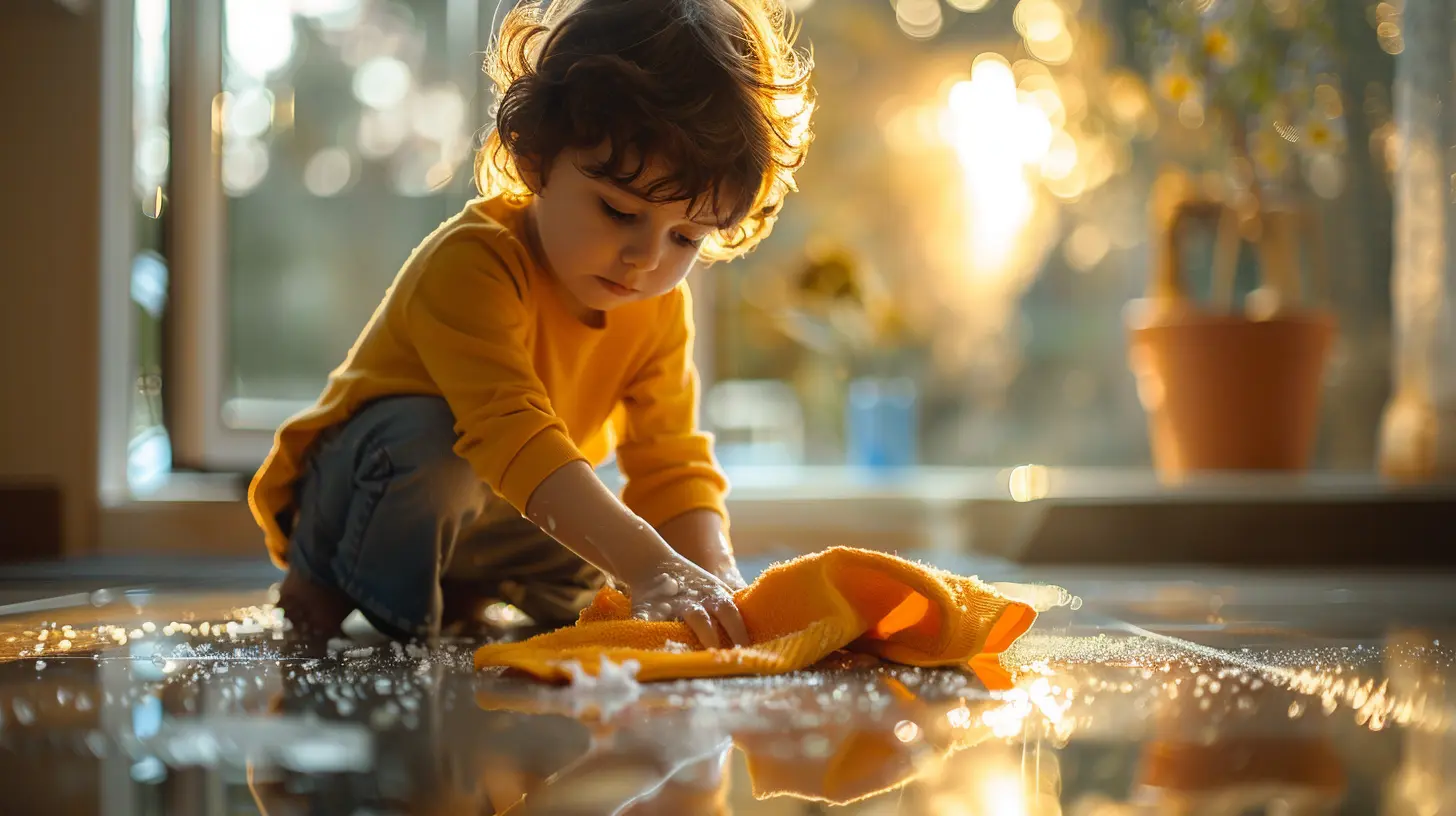25 April 2025
Ah, chores. The bane of every child’s existence and the never-ending battle of every parent. If you've ever tried to convince your toddler that putting away their toys is more fun than watching Bluey for the 87th time, you’re not alone. But what if I told you there’s a magical way to make chores feel less like a medieval form of torture and more like an empowering life lesson? Enter the Montessori method—a parenting philosophy that somehow tricks kids into thinking chores are fun (or at least tolerable).

Wait, You Want Me to Let My Kid Do Chores?
I know what you’re thinking: Why on earth would I willingly invite my tiny tornado of destruction to “help” with housework? Isn’t it just easier (and cleaner) to do it myself?Sure, if you love doing everything forever. But if you'd rather not be scraping dried spaghetti off the walls until they leave for college, now is the time to get them involved. The Montessori approach emphasizes independence, responsibility, and practical life skills—which means your child can actually contribute to household chores instead of just creating more work for you. Revolutionary, right?

The Montessori Mindset: Chores As Opportunities
Most kids hear the word chores and immediately assume they've been sentenced to hard labor. But in the Montessori world, chores aren’t punishments. They’re simply part of life—things we all do to take care of our shared space.By allowing kids to participate in everyday tasks, we’re giving them a sense of purpose. And let’s be real: kids love feeling important. So instead of treating chores like dreadful tasks, Montessori suggests framing them as meaningful contributions to the family.
Think of it this way: when you cook dinner, do you do it because someone forced you, or because you want your family to eat something other than stale Goldfish crackers? (Okay, some nights it’s debatable, but you get the point.) The goal is to help kids see chores as just another part of their daily routine—not something to dread.

Age-Appropriate Chores (a.k.a. How Much Can I Get Away With?)
Before you start handing your toddler a mop and calling it a day, let’s talk about age-appropriate tasks. Montessori is all about setting kids up for success, so the key is to give them jobs that match their abilities (and attention span).For Toddlers (Ages 1-3): The "So Cute It Hurts" Stage
Yes, even the tiniest humans can help! They may not be the most efficient workers, but the effort counts.- Putting toys in a basket (because let’s be honest, their “clean-up” method is just shoving everything in one place)
- Wiping up small spills with a cloth
- Throwing trash in the bin
- Handing you utensils while setting the table (expect chaos, but embrace it)
- Watering plants (translation: drowning them with excitement)
For Preschoolers (Ages 3-6): The "I Do It Myself!" Phase
This is when kids really start craving independence—so milk it for all it’s worth.- Folding small towels (will they be actually folded? Debatable.)
- Matching socks (good luck making it a pair, but hey, close enough)
- Feeding pets (expect kibble everywhere)
- Sweeping with a kid-sized broom (if they don’t use it as a weapon first)
- Helping load the dishwasher (aka stacking everything like a Jenga tower)
For Early Elementary Kids (Ages 6-9): The Competence Crisis
At this age, kids can actually do things—though their enthusiasm might fluctuate wildly.- Setting and clearing the table
- Making their bed (note: “making” will probably mean pulling the blanket up and calling it a day)
- Preparing simple snacks (yes, peanut butter sandwiches count as culinary skills)
- Taking out the trash (expect some whining, but stay strong)
- Sweeping and mopping (though they might just push dirt around like a Roomba on low battery)
For Older Kids (Ages 9+): The “I Can’t Hear You” Era
They are fully capable but will act like chores are a personal attack. Stay firm.- Doing the laundry (including folding, even if they pretend they don’t know how)
- Washing dishes (without leaving soap on everything, hopefully)
- Cooking basic meals (because someday they’ll need to feed themselves)
- Vacuuming (yes, they can push a button and drag a machine)
- Mowing the lawn (oh, the horror of outdoor labor!)

The Secret Sauce: Make It Feel Like a Game
If you just say, "Time to clean up!", don't be shocked when your kids suddenly lose the ability to hear. But if you frame it as a game? Boom. Instant participation.- Beat the Timer – Set a timer and challenge them to finish a chore before it runs out. (Warning: This may lead to wild, reckless cleaning.)
- Chore Bingo – Make a bingo card with different tasks; they get a prize if they complete a row.
- Mystery Chore – Write chores on slips of paper, fold them up, and let kids draw their “mystery task.” Somehow, this randomness makes it fun.
- Music Cleaning Party – Blast their favorite songs and turn chores into a dance party. (Just expect some questionable dance moves.)
The Montessori Magic: Child-Sized Tools & Real Tasks
Montessori emphasizes using real, functional tools that fit little hands. This is a BIG DEAL. If you hand a toddler an adult-sized broom, don’t be surprised when they trip over it and declare sweeping “too hard.” But a mini broom? Game changer.Here are some Montessori-friendly tools to make chores more manageable:
- A child-sized broom and dustpan so they can actually sweep without feeling like they’re jousting
- A small spray bottle with water so they can “clean” without drenching everything
- A tiny watering can so they don’t flood the plants into oblivion
- A step stool so they can reach the sink without performing acrobatics
- A laundry basket just for them so they can carry their own clothes
When kids have the right tools, they’re more likely to take ownership. And when they feel capable, they’re more likely to willingly help (instead of collapsing in dramatic despair every time you say “clean up”).
Expect (and Accept) the Mess
Listen, your child’s version of “clean” is going to be questionable. If you expect military-level precision, you’re setting yourself up for disappointment. The goal here isn’t spotless perfection—it’s encouraging the habit of helping.So when your toddler wipes the table and somehow makes it dirtier? Praise the effort. When they try folding laundry and create a bundle of vaguely crumpled fabric? Applaud their attempt. Their skills will improve over time, but the key is making chores a positive experience now.
The Ultimate Payoff: Kids Who Actually Know How to Do Things
Montessori chores aren’t about child labor (though it’s a nice bonus). They’re about raising kids who feel confident, responsible, and capable of contributing to the world.Think about it: do you want your kid to grow up and move out, only to text you at 25 asking "How do you do laundry?" No? Then start now. Teaching them to handle small chores today means they’ll be able to handle bigger responsibilities tomorrow.
And hey, who knows? Maybe one day, they’ll even thank you for it.
(Okay, let’s not push our luck.


